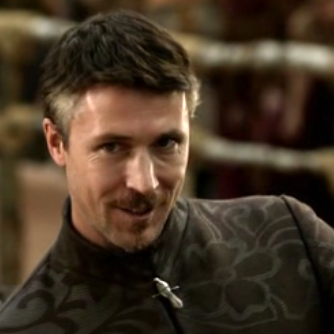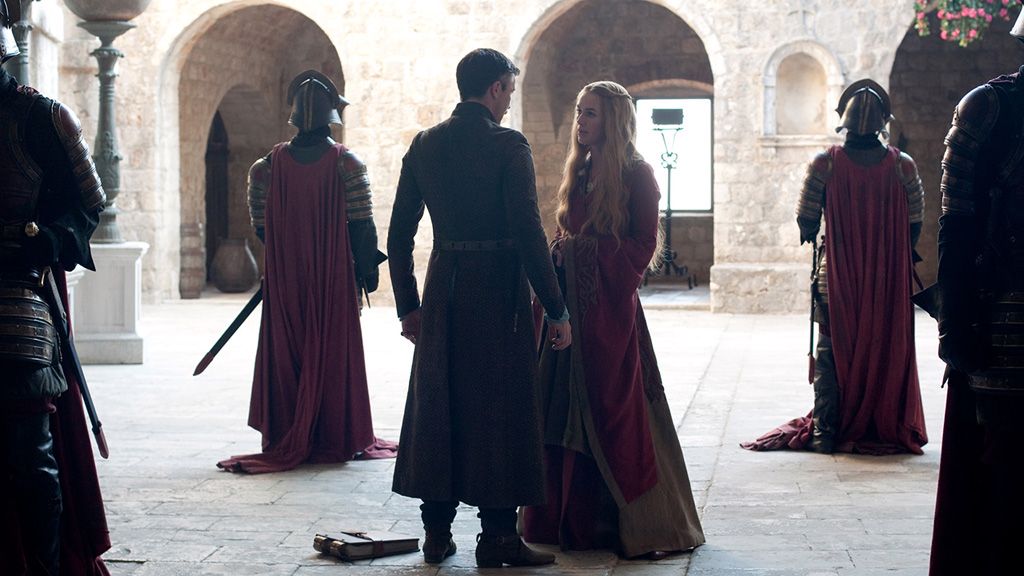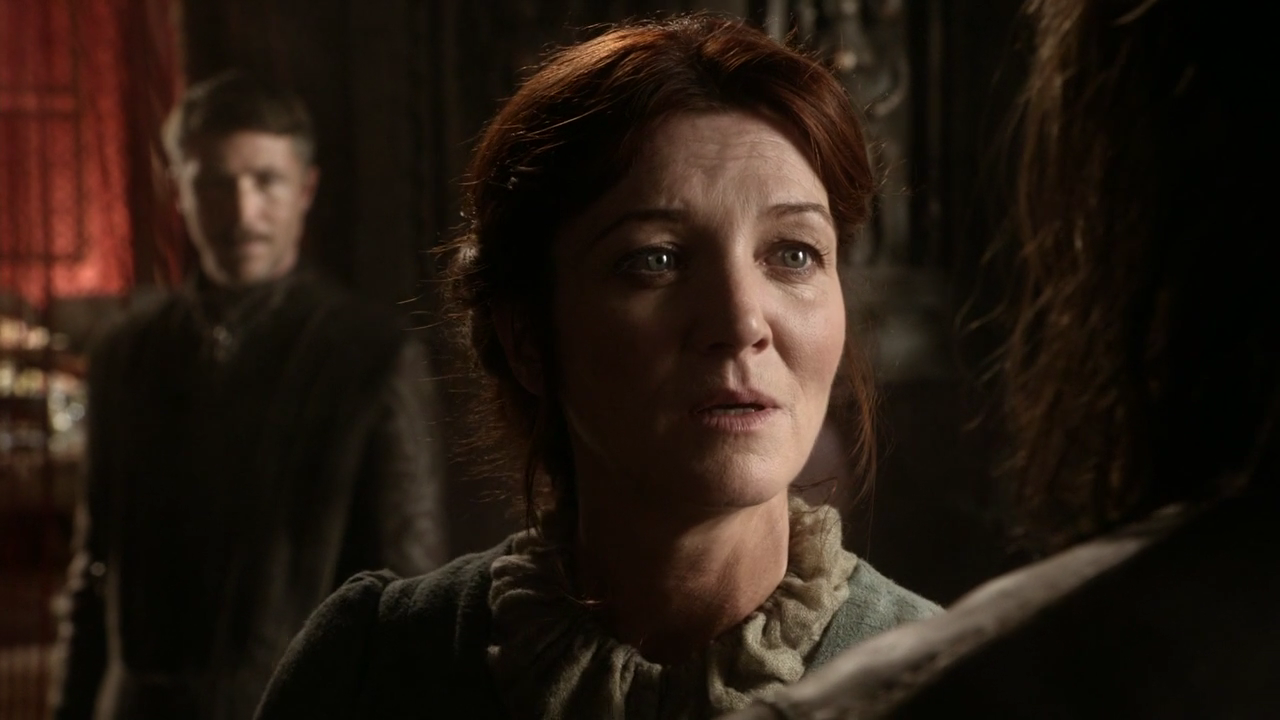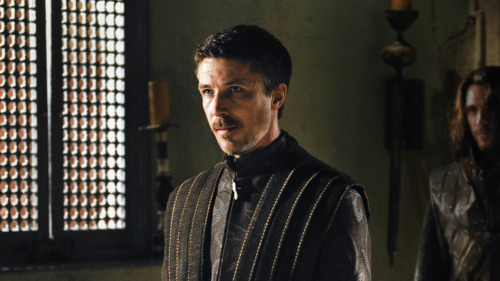Besides Jon (and Ros, but she’s invented and technically doesn’t count), no character receives as much hatred for a supposedly bungled transition to the screen like Aidan Gillen’s interpretation of Littlefinger. He has been accused of being made murky by a partial merger with the Hound in season 1, of being much too inapt over the course of season 2 and of being a caricature Dr. Evil in season 3. Now it seems strange that Littlefinger is almost continuously not liked, but for different and shifting reasons, and while I admit that Gillen’s interpretation took some getting used to, I have to say I’m pretty much satisfied with his depiction in the show. Let me explain why.
 |
| Not reading this essay is the dumbest thing you did since trusting me, my lord. |
 |
| What, me? |
Littlefinger became more front and center in season 2, and some of the most contested scenes stem from this season. On the one hand, we have the sheer inaptitude he displays dealing with Cersei and not getting anything done in King’s Landing besides dissing Varys. On the other hand, we have his teleporting around in Westeros and talking with Tywin as well as Loras Tyrell. To be clear: the Littlefinger that was presented to us in season 2 left much to be desired for. Not only did he seem to do nothing else but grin and state the obvious, alienating important players left and right, but he also was treated like he was somehow successful for no good reason. The show told us that Littlefinger was dangerous and a good schemer, but his depiction seemed kind of off in regards to that.
 |
| Scheming Eddard's hand around his neck in a few seconds. |
I think much of this stems from the structure of the books. When you come down to it, “A Clash of Kings” doesn’t really feature much of Littlefinger. It’s Tyrion’s book, basically, and his dealings involve Cersei as the main antagonist, which is the only acceptable excuse for him to never following up Littlefinger’s lie about the dagger. Littlefinger in the book is a sidelined figure and makes the occasional remark, but in general, he does nothing at all, a fact Cersei complains about on at least one occasion we know of. His first real action is maneuvering himself into a position where he will be the only viable candidate to go to Loras Tyrell, leaves King’s Landing and comes back only to claim his price. If the show had taken this blueprint seriously, Gillen would have appeared in two episodes. As with Varys, however, they chose to depart from the Point-of-view-structure of the books and essentially give us more scenes with these schemers, which I deem a clever choice given the importance they play in these events.
 |
| Hi Sansa. Want to visit my bedroom? |
However, one can argue that the transition worked much better for Varys than for Littlefinger. In my estimation, three scenes are responsible for the negative anti-Littlefinger-backlash: his encounter with Cersei about finding Arya Stark, his encounter with Tywin proposing the Tyrell alliance and his encounter with Catelyn Stark, doing…nothing, really. In all three scenes, Littlefinger comes out on the short end of the confrontation (pun intended) and it seems like by rights his head should have been chopped off some time prior for sheer insolence. Now, I’d argue the scene with Cersei receives unfair criticism. It is definitely not out-of-character for Littlefinger to brag around those he doesn’t deem a threat and to forget some realities due to his own sense of importance. It’s his driving character motivation, after all – to stick it to the high lords. I think many book readers make the mistake to extrapolate his successes with this tactic in regards to Tyrion and Eddard, who both basically suck up his insults to everyone. Littlefinger isn’t really a good people’s person, able to read people like other players are (I made this point in my “Biting the feeding hand” essay), and he also has a constant urge to show everyone how clever he is. This urge is paired with real capabilities, a fact that many tend to overlook (especially, to his sorrow, Eddard Stark), but it’s a real weakness nonetheless. So, letting his tongue slip around Cersei seems perfectly in-character to me.
 |
| That scene. |
The problems start when the same happens with Tywin Lannister. Here, Littlefinger really should know better. You don’t need to know much about people to know that Tywin Lannister is no one you can impress with words. But Littlefinger keeps on bullshitting and gets torn a new one by Tywin, who chides him for pointing out the obvious (which, granted, isn’t obvious to most of the lesser politicians Littlefinger usually is surrounded by). But really, from the performance in Harrenhal, there’s no reason for the upcoming reward later (especially considering that it’s Margaery himself who gives the right motivation (“I wanna be THE queen”) instead of Littlefinger, who just sheepishly asks her, although that’s in-character again). And then, we have the encounter with Catelyn, which was strange, to say the least. Both scenes, Harrenhal and Storm’s End, seemed to use Littlefinger to create a tension that wasn’t there before (in the case of Harrenhal creating the risk of Arya’s detection, that ultimately summed up to nothing, and in the case of Storm’s End to get a diplomatic triangle and to raise the stakes of the ultimately fruitless alliance negotiation talks). Littlefinger is used as a stand-in for the undefined dangers that come from the King’s Landing politics, and that’s simply not a role he’s well-shaped for. Of course, the writer’s had no choice. If they wanted these scenes, there was no developed character other than Littlefinger for them. I guess the mistake was doing these scenes in the first place.
 |
| Imagine a random derp in the background. |
The result is a very ambiguous picture of Littlefinger in the second season. He came off as a brutal opportunist in season 1, just like in the books, dooming Eddard Stark and coming out on the winning side. That’s how everyone sees him, which is why they are surprised by his Harrenhal-pitch in “A Clash of Kings”, but that’s nothing that happens on the show, therefore leaving Littlefinger in the slimy-opportunist-camp, but telling everyone just how important he is.
In season 3, however, the ship changes course again (heh), and Littlefinger finally comes into his own. It’s in season 3 in which I don’t understand the criticisms against Gillen’s interpretation of the role anymore. In his dialogues with Varys, he comes away as more much more dangerous than he did in his pointless dissing in season 2.
 |
| I love me a good council session! |
But the real competence-boost comes with the uncovering of the Tyrell conspiracy. Mirroring the failure with Cersei in season 2, Littlefinger this time provides the information required within one day because he strategically placed a spy in Loras Tyrell’s surroundings. But, true to his twisted schemes and priorities, he tries to prod Sansa away from them before. Sansa of course wants to marry Loras and not go with the creepy Master of Coin to some unknown future. In the few moments when she tries to stall Petyr, you can see on his face the immediate switch. That’s him, climbing the ladder of chaos. One plot fails, another one is immediately and relentlessly pursued, without a moment’s hesitation or remorse for the one that just failed. He strategically uses the Lannisters as means to his end in order to keep Sansa in his reach and to become irreplaceable, a position he didn’t earn before but that is now justified – remember, Varys didn’t bring that information, a fact that surprised Tyrion in the books, too.
 |
| Smirk, smirk |
Now let’s approach the last subject that’s hotly debated currently – Littlefinger’s murder of Ros and the speech about the ladder and the climb that goes with it. The criticism so far, as I understand it, is that it removes the veil too early (we only really learn of Littlefinger’s involvement and plans at the end of “A Storm of Swords”) and reduces him to a mustache-twirling cardboard villain. While it is true that Gillen plays his Littlefinger pointedly evil, please keep in mind that Littlefinger IS evil. He is an egocentric psychopath who not only developed a very creepy obsession with a teenager girl, but he also plunges the Seven Kingdoms into war for the only reason of climbing up the social ladder. He willfully accepts thousand fold deaths just to stick it to a society that he feels treated him wrongly. Now, many argue that we never see him twirl his mustache like that in the books, nor hold any speeches.
 |
| It's all in the game, man. |
But that argument doesn’t hold any water in my opinion. The problem is that we only experience Littlefinger in the books from the perspectives of three (!) people: Eddard, Tyrion and Sansa. None of them is ever in a position to get a Littlefinger-mustache-swirl. Varys, on the other hand, is. He’s no POV in the books, so we don’t know anything about his relationship with Littlefinger, but I guess it is mostly as depicted in the show. Both of them know too much about each other to get at each other’s throats (Mutually Assured Destruction by high treason), but they try to obstruct the other one where they can. Since no one can talk freely about the other anyway, why not admit to the obvious at times? Now please take into consideration that Littlefinger likes to brag. A lot. Look at his relationship with Eddard Stark: “Not trusting me was the wisest thing you did since you climbed off your horse.” This guy loves to show his brains, especially if no one is the wiser. He teases, a lot, and that’s why I have no problem with the Cersei-scene in season 2: it totally fits. Littlefinger just is like that.
 |
| Shit just got real. |
I thought the outing in “The Climb” to be rather brilliant, transforming the guy into a villain. Please keep in mind that the show pretends you haven’t read the books. That means you’re not supposed to know just what Littlefinger’s motives are. We learned that Varys wants to destroy magic, additional to just having power in court, and now we learn that Littlefinger basically wants to be king upon the ashes. True enough, in the books you learn only later, but that’s because neither Littlefinger not Varys are POVs. In the show, there’s no way to keep them away for so long. Compare it to Barristan’s immediate outing, if you want. Great in the books, not feasible for the show. The same is true for Littlefinger. People really need to stop using “it’s different than in the books” as their main method of asserting the quality of any given scene and start trying to see them in the show’s cosmos. And here, the new Littlefinger makes sense. Much more, I say it again, than he did in season 2, where was merely a plot vessel. I for one am looking forward to seeing more of the Littlefinger the show creates.
Nice article. I liked Littlefinger's portrayal in Season 1 as it really made him out to be the cunning and ruthless schemer that he is. But Season 2 was really problematic. Not only did his accent change massively, but his behavior was out of character. Despite his ego, I don't believe he would ever dare insult Cersei so blatantly. His insulting of Ned in Season 1 was never so bold and so was in keeping with the books.
ReplyDeleteBy Season 3, I had got used to Littlefinger's new accent but only came to enjoy it in his 'Climb' monologue, which was excellent. I had expected the Ros murder to happen as I knew that the showrunners had to rebuild Littlefinger's credentials and I think it worked out great. In Season 4, Littlefinger should turn in another strong performance and his Season 2 mistakes will hopefully be long forgotten. That said, his Season 1 accent will always be the best for me, and I would love him to go back to it.
I was searching the internet for ANYONE who noticed Gillen's accent change in the show and found this post. THANK YOU. I thought I was going crazy lol. I too prefer the season 1 accent.
ReplyDeleteNice article by the way :)
The "accent change" is done on purpose, it's not as if it was bad acting on Aidan Gillen's part, the character goes through a similar change in the books, it's part of his story :)
Delete